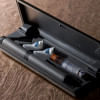Study: Rock music could replace insulin injections

In a study published in The Lancet Diabetes & Endocrinology (Volume 11, Number 9) titled "Tuning of cellular insulin release by music for real-time diabetes control", it was revealed that researchers managed to engineer cells to release insulin in response to specific sound waves; more specifically, the music of the band Queen.
Led by ETH Zurich's Bioengineering professor Martin Fussenegger, the study used a mechanosensitive ion channel to signal cells into making insulin in response to specific sound waves. These MUSIC-controlled, insulin-releasing cells (where MUSIC is short for music-inducible cellular control) were cultured in a lab next to loudspeakers.
Some of the songs used in this study included Michael Jackson's "Billie Jean", Queen's "We Will Rock You", and Beethoven's "Fur Elise". Researchers found that Queen's "We Will Rock You", at a volume of 85 decibels, prompted the strongest insulin release.
Upon experimenting with diabetic mice, researchers found that listening to "We Will Rock You" for 15 minutes once a day normalised the insulin levels in the mice's blood. At the same time, it was found that the mice's blood sugar levels returned to normal.
Although a long way to go, this study suggests that we might, one day, be able to replace insulin injections with rock music.

 For all latest news, follow The Daily Star's Google News channel.
For all latest news, follow The Daily Star's Google News channel. 








Comments